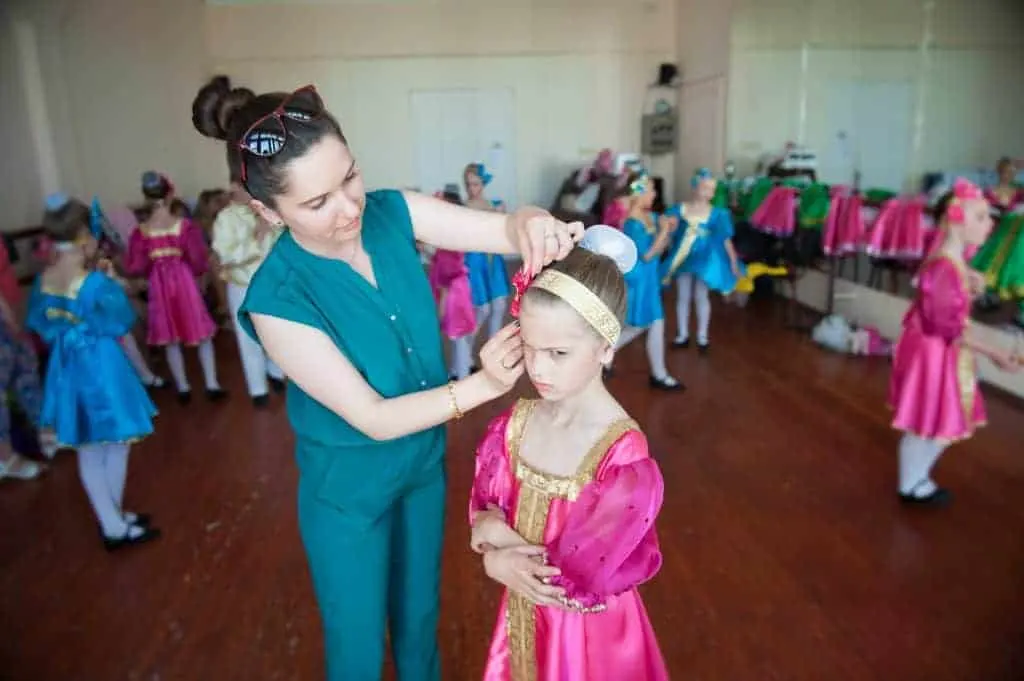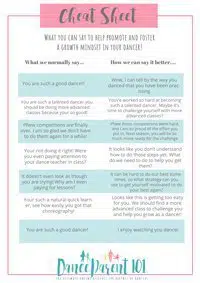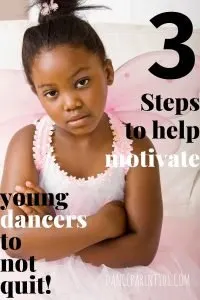
It’s thirty minutes before your kid’s dance class and you need to leave in ten to get there on time but your child isn’t even dressed yet and when you tell them to hurry up or they will be late, out comes the dreaded reply ‘but I don’t wanna go to dance class anymore!‘
So should you let your child drop their ballet or dance classes or force them to go? Well, the first thing is to work out why they don’t want to go. Next, you need to find a solution to their problem, the last step is gently motivating and encouraging them to stick it out at least until the end of the term or season when you can decide whether to re-enrol or not!
When my kids do this (because it’s happened on multiple occasions) a hundred thoughts run through my head the top two being I am raising a quitter and I just spent $$$$ on new ballet shoes!!!! I try my hardest to practice being a peaceful and conscious parent but in that initial instant when all I want to do is get my kid to their prepaid dance class, bribing and threatening seem like pretty good options to get them out the door.
But even if bribing and threatening are succesful they don’t work in the long term or have the adverse effect that whatever you bribed becomes a weekly ritual and your threats become bigger and bigger every week which no one can maintain.
THE 3 STEPS TO STOP YOU CHILD QUITTING DANCE OR BALLET LESSONS!
So how can you motivate a young dancer to not quit and keep on at their lessons even if it is just until the end of term or the season?
STEP ONE: Work out why they don’t want to go
STEP TWO: Find a solution
STEP THREE: Encourage and Motivate your child
Three steps make it all sound too simple but seriously it can be! Using this method you can get out of that door in 10mins
STEP ONE: Work out why they don’t want to go
Before you can start this step you need to work on YOU! You first need to quieten all those voices in your head which are screaming things like: but last week you loved dancing or but I paid for you to go until the end of the season already or how will this kid ever learn to stick with things if I let them quit now?
These are all valid arguments to an adult, but to a child, they mean diddly squat! So you need to do some adulting here and take the high road so you can listen to your child even if you think you are right and they are wrong. For all you know they don’t want to go because another child is picking on them in class and wouldn’t you want to know about that so you can nip it in the bud!
But how can you silence the voices quickly you wonder, you only have 10mins to get out the door after all? I am not going to lie, it does take practice but each time you become aware that it is an option your zip it muscle becomes stronger. You can try some of the following:
- Count slowly down from 10
- Do a quick mindfulness practice, calm your mind by becoming present to one thing you can hear, see, smell, feel and taste.
- Walk away from your child, into another room and close the door, to breathe and collect yourself.
- Lie with your back on the ground – some parents swear by this as it changes their state and behavior instantly.
- Have a drink of water
- Wear a piece of jewelry that anchors you when you touch it to remember to parent from a place of love, not fear.
Once you are ready ask your child gently why they don’t want to go to class. And if they answer with I don’t know or I just don’t wanna then you will need to change the way you are asking. You might have to be playful and start them giggling (not through tickling though as they can’t control that) to get it out of them or maybe they need some hugs to be able to get it out.
Sometimes young kids don’t always know where their feelings are coming from and so you might need to be a bit of a detective in this situation. The following are a whole list of reasons why your child might not want to go to ballet or dance class:
- They’re hungry or thirsty
- They are tired
- The class is too late in the afternoon for them to concentrate
- They want to finish a program they are watching or game they are playing.
- They don’t like the style of dance
- They don’t like having to follow instructions and copy the teacher, they would rather just dance to music at home.
- They don’t like their teacher
- They might have been told off in the last lesson
- They are not getting on well with the other students in the class
- They don’t like being separated from you
- You are stressing them out by placing to much stress on them to attend the class
- Their dancewear is uncomfortable
- They are worried about the recital and dancing in front of people or wearing makeup.
STEP TWO: Find a solution
Once you have an understanding of why your child doesn’t want to go to their dance or ballet class you can now work on finding a solution. The following are a few ideas for each of the problems you might encounter with your child. Just make sure you take their problem seriously, they might be little but kids feelings are real to them and even if you don’t think their problem is worth all the drama they are creating, you don’t need to pass your judgment on that to them, you will get a quicker and better result when you are able to empathize with your child and help them work out an amicable solution!
They’re hungry or thirsty
Offer to help your child dress as they eat a quick snack or have a drink or make them something that they can eat on the way. Take a second snack with you and put it in their dance bag so they know they have something to eat straight after class and make sure you have their drink bottle as well. If at first they say they don’t want what you are offering, don’t get mad, gently ask what they wish they could have and then negotiate from there. They could surprise you by saying an even healthier snack then you were offering which sometimes happens with my daughter!
They are tired or the class is too late in the afternoon for them to concentrate.
It can be hard when kids are tired to get them to reason with much of what you say, so don’t try to reason with them. Empathize and agree with them about what they are feeling, give them some hugs and ask them what help they need from you to get ready if they are soooo tired. If they want you to carry them, then carry them if they want you to dress them lying in their bed then do it! Once you’ve gotten them to dance class it is then time to work out how to make sure they aren’t that tired again and work on prevention. This might mean making sure they have a nap if they are a preschooler or switching to a morning class on the weekend if they are at school. Whatever strategies you think will work for your child.
They want to finish a program they are watching or game they are playing.
For this one simply turning off the television or packing up your child’s toys will ultimately lead to a battle between you and them and I know for me I like to only choose to fight those battles I know I am going to win. Instead negotiate with them. Can you spare two minutes to let them finish or could you dress them and do their hair whilst they finish up. Ultimately, if you can see that your child is engaged in something you know won’t finish before you need to go you need to take responsibility for that and next time be more mindful about it and prevent it from happening.
You have the information! You understand time and have the ability to read a clock. For a child time isn’t an easy concept to understand 2minutes, 5 minutes, 30minutes can feel relatively the same to them depending on what they are doing. When you take some responsibility for the fact that they aren’t willing to finish, it makes it easier to not turn the issue into a show down. Maybe you can make a deal that they watch the rest when they get home or on your phone in the car on the way? Maybe you can leave their toys exactly where they were so they can go straight into playing when they get home or perhaps they can take some toys with them to their class?
They don’t like the style of dance
Perhaps your child saw all the other kids stay for a tap lesson last week after ballet or saw some dancing in a program and now want to do that style instead. Be curious at first and find out why they like that new style so much. It might be they get to wear tap shoes or their hair in a ponytail or dance to popular music.
This has happened to me before and what I have done is told my daughter that it sounds great that she wants to try a different style and that her lesson was that day we could talk it over with her teacher. This usually gets them out the door. But what next if they really do want to do the other style for the rest of the season or term?
You can initially talk to your teacher about a trial class in the other style. If your child enjoys it you then have to make the decision to swap them or insist they stick out the term or season in the selected style. If you choose to let them swap it might involve some costs for new shoes etc.. (you can always sell and buy second hand) and swapping class times which you might be happy with. Alternatively, especially if there are only a few weeks left of a term or season you will probably be insisting they finish that out, and many teachers will tell your child that it is too late to join or swap a class at that time anyway so you will have them to back you up!
They don’t like having to follow instructions and copy the teacher, they would rather just dance to music at home.
This one is in here because my eldest daughter after two school terms of ballet wanted to quit. Towards the last few weeks of the second term, she began to consistently tell me she didn’t want to go because she just wanted to do her own dancing. I believe the reason she stuck it out until the end of term was because I said she didn’t have to go to dance lessons anymore, once the classed had finished for the year. By giving her what she wanted in the first part of the sentence and an ending point I fulfilled her wish and she was happy with that.
Now if you are at the beginning of the term and your child is saying this to you right after you committed to paying tuition fees and after buying the studio uniform, head down to our 6 strategies for motivating a young dancer as these will help you out immensely!
They don’t like their teacher or they might have been told off in the last lesson or they are not getting on well with the other students in the class
There is not a lot you can do finding this information out 10minutes before you have to leave for your child’s dance lesson, but you can tell your child what action you can take after or during the lesson for example:
- Can you ask to sit in and watch the lesson?
- Is there a viewing window, can you promise to watch the whole lesson so you can see how the teacher or other children are treating your child?
- Can you promise to try and talk to the teacher before or after the lesson if there is time or make an appointment with them if the teacher’s classes are back to back?
- Have you been slightly concerned yourself having watched several lessons already? Can you tell your child you are not happy either and are looking at changing their lesson day to a new teacher or with different students?
Telling your child that you are going to help them resolve their issue might be all that they needed to get them out that door. But it is important that you follow up on whatever you have said you would do.
They don’t like being separated from you
When my daughter doesn’t like being separated from me I will usually give her a special item that holds all my love for her to wear or carry and to touch or see when I am not with her. Being in a ballet class this might be a bit hard as your school might have a dress code, but perhaps one of the following suggestions might work.
- If it is your daughter, let them wear one of your hair accessories such as a hair clip, hair tie or scrunchie.
- It the teacher allows them to, can they take a teddy bear or doll to sit in on the class in your place. Make sure you hug the teddy and give them special instructions before they go in.
- Could they use your drink bottle for the class.
- If they have their dance bag in the room with them could you put the special item in there or even a photo for them to look at when feeling upset?
If your child still is unable to detach from you, you will also need to begin asking the question is your child really ready to go dancing classes yet? And you may say of course they are, they go to daycare or other places which is great, but going to a dance class is different. I used to drop my kids off crying at daycare because I had no other choice, I needed to get to work. But it was the people at daycares job to comfort my child and make them feel safe for the 8 hours I was at work. Dance class is different. The teacher is there to instruct and not to cuddle and hold your child which would mean that all the other children in the class would not be receiving the proper instruction they came for. Your child needs to be able to follow instructions and self regulate themselves for 30-45mins. There is no harm in withdrawing them from lessons until they are ready. And you can read more about the best age to begin dancing lessons in our article What is the best age to start dancing. Real answers for parents!
You are stressing them out by placing to much stress on them to attend the class
Now this one is going to be a really hard one to figure out as it is unlikely that unless your kid is a pre-teen or teen that they will tell you this straight out. So if at the end of the day you can’t seem to find any plausible reason why your child doesn’t want to go dancing class, have a look at if you might have been pushing them too hard or too early to begin dance classes and figure out how you need to do to change so that they want to dance again.
Their dancewear is uncomfortable
There is a little girl in my daughters preschool ballet class that doesn’t want to wear ballet tights because she doesn’t like the feel of them. Fortunately, the little girl wants to dance and so she is able to coax her into wearing them by being gentle and caring and acknowledging that they itch and letting her know they will take them off straight after dance lessons. If your child is still adamant they don’t like the gear, unless they are getting a rash from it or it is too small and hurting them, I would feel that the dancewear issue is just masking the real issue which could be something suggested above or below here.
They are worried about the recital and dancing in front of people or wearing makeup.
Another little one in my daughters class after two lessons quit, although my daughter told me in she told her in kinder the other day she was going to start coming again. The reason being she didn’t want to wear the makeup.
I would suggest that for both being worried about dancing in front of people and wearing makeup that lots of practice beforehand can make your child less stressed about either.
Give your child a bag of their own makeup to experiment with at home, let them put makeup on you and then ask if you can do theirs. Do this several times before the big day so you both know what to expect.
And as for dancing in front of people, ask your child to practice in front of you, their grandparents, aunties, and uncles. Anyone, they feel comfortable dancing in front of to help them gain confidence. If they just won’t talk to your dance teacher. Many studios give their students the option of performing in the recital and therefore maybe without the added stress of knowing they have to perform in front of others they will enjoy going to their classes more. The consequence on missing out and watching others get fitted for costumes and rehearsing may also give them the motivation they need to join in next time.

STEP THREE: Encourage and Motivate your child
So you have listened to your child and come up with a plan or solution to getting them to dance class. How do you continue to encourage and motivate them to stay in dance class?
Here are 6 effective strategies for motivating a young dancer:
- Encourage a growth mindset
- Value Down Time
- Don’t Set Unrealistic Expectations
- Praise and Honor Their Effort
- Make It Fun
- Be Supportive
The above sound simple and its a bit like umm I am supportive! But are you being supportive of your goals or theirs? The life of a dancer can be a stressful one, especially for a child. And as a parent, you want your child to enjoy the sport or activity they choose to explore but you also want them to develop some grit and learn to not quit when things get hard or uncomfortable. So you have to walk that delicate balance of encouraging them because you don’t want them to quit and because you just want them to be happy.
1. Encourage the development of a growth mindset
Dancing is an art form that is developed over a lifetime. It’s easy for anyone to get discouraged when they’re not immediately great at something when they first start. Because of that, it’s also hard to stay motivated, especially if your child has a fixed mindset and tends to think negatively as though they can never get any better than they already are.
A growth mindset, coined by Carol Dweck, is when people believe they can get better at anything through hard work and practice. To be successful Carol Dweck through her research and in her book, Mindset – The New Psychology of Success found that a person needed to have a growth mindset rather than a fixed one which means you believe that the talents you were born with are all you have and you will never be able to be better than that.
Even the best dancers have feelings of discouragement and failure. If a particular class or performance didn’t go well, or everyone else is able to master a new step or skill quickly, it’s easy to feel as though you are a bad dancer and be unmotivated to continue.
PARENT TIP:
At these times, it’s important that you the parent are there to help your child create an internal dialogue that reflects a growth mindset. We have a free cheat sheet available with things you can say to promote a growth mindset as part of the freebies we give to new members of our weekly newsletter. Click here to subscribe! Enforce that it is okay to make mistakes. For some dancers, it may take longer to learn certain moves or dances than others. With newer dancers, it’s also normal for them to make mistakes.
2. Value Down Time
Even though you want to encourage your child to dance, you also have to show them the importance of taking a break. Relaxing and taking a break from dancing will give them time to want to get back to dancing. After a couple of much needed days or even weeks away, this will make them miss the studio and their team.
For a dancer, most of their time is taken up by their craft, especially if your young dancer is on a competition team. Having time away from the studio and just relaxing is just as valuable as time spent practicing. Especially if your dancer is in school before practices, having extra time to relax is essential to them not burning out.
Kids also need time just to be kids. regardless of how much they may love it, being a dancer is a lot of work. From rehearsals to the actual performances, a dancer is put through a lot of stress and it’s easy to become overwhelmed and to burn out.
PARENT TIP:
Spend some extra time with your child doing the things that they want to do. Dr. Laura Markham creator of AHAparenting.com recommends doing special time every day with your child to help build your connection with them by doing what they want to do and not working on your own agenda. She writes all about it in her book Peaceful Parents, Happy Kids. At other times it is also important to talk with your child about their dance classes and really make sure you listen to them while they talk.
3. Don’t Set Unrealistic Expectations
Another important way to keep your young dancer motivated is to not put unrealistic expectations for them. It can be incredibly upsetting to a child when they feel like they’ve disappointed their parent or their teacher, especially when they feel as though they did their best.
Setting up small goals to work on accomplishing is a healthy way to challenge them and to get them to improve. However, you shouldn’t expect them to be master dancers, especially if they’re younger. You might have seen young kids on tv shows doing incredible things at the same age as your child, but keep in mind that many children who are pushed too hard (not all) when they are young burn out and quit when they are older wanting to just be like other kids and teens or develop a fixed mindset thinking they hit their peak when they were 12 and will never top that. So and For instance, you can help them set simple goals like to run through a number without forgetting all of the moves, to stay on count or to get better at the splits.
PARENT TIP:
You can help your child set simple goals like to run through a number without forgetting all of the moves, to stay on count or to get better at the splits. Help your child create a way of recording this whether it be in a journal tracker or even before and after photos or video.
4. Praise and Honor Their Efforts
As with doing anything, praise is a great motivation boost, especially for children and you can refer to our cheat sheet on developing a growth mindset available to our newsletter members here for the best tips on how to do this!
Honoring your child’s and even their team’s effort after reaching their goals or after a hard class or great performance is a great way to keep them interested and motivated in the dance classes.
PARENT TIP:
You might like to bring a small gift for your child after their recital or performance such as flowers. If your stuck on what to get we have an article with a great list of over 80 things dancers of all ages need and want here. Little gifts like these will really make their day and also act as an incentive to come back.
Experiences are sometimes better than a gift. The weeks leading up to recitals, exams and competitions can be a really stressful time for dancers. Doing things like having a pizza party after class or movie night is a great way to get them excited for a show and promotes bonding if done with their team, but also helps to distract them from the stress. You can also facilitate a sleepover or a time for them to hang out outside of the studio.
5. Make It Fun
When trying to motivate your dancer, you have to remember that they are just kids. In order to keep kids engaged and interested in things, you have to make things fun. Kids get bored easily, and it can be hard to keep their attention at times, especially when they’re doing repetitive things.
As a parent, it is hard to ensure that your kid is having some fun in the dance classroom, but if you have done your research and chosen the right school your experienced teacher should be doing this. If you need some help finding the right school you could try reading our article How to Choose the Best Dance School Near Me for some tips. Dance teachers can make class fun by doing warm-ups games, having dress-up days such as on Halloween or Pajama days at the end of term or using music your child enjoys listening and dancing.
PARENT TIP:
You can make dancing at home fun and not all about practice and stretching! Have spontaneous family dance parties. Just put on some of your favorite music and jam it out in the lounge room or kitchen. Put on some you-tube dance tutorials such as the ones from our article The Best Free Online Dance Classes for Toddlers and Preschoolers or our one for School Aged Kids. Read books and watch movies about dance. Take your child to see live performances, or make a ritual of watching the latest dance TV competition with your child each week.
6. Be Supportive
Another main way to keep your young dancers motivated is to be supportive of them. As a parent, you want your dancer to succeed, but sometimes that support gets lost in translation during the stressful moments of learning choreography or the day of a performance. Never let your dancer forget that you are on their side!
A positive attitude can make a world of difference when you’re raising a dancer. As we’ve expressed before, the life of a dancer can be extremely stressful. So, having someone who they can rely on to cheer, smile and give the thumbs up on the sidelines is so important to keep your dancers’ attitude up, as well.
But this is not to say you always need to be all smiles. Being supportive also means empathizing and listening to your child when things aren’t going well, ensuring they get adequate sleep and have healthy meals and snacks to eat. Being supportive means paying your dance class fees on time so the teacher isn’t asking them to follow those up with you and placing stress on them. It means ensuring they get to class on time and that they have a safe way of getting home. It is buying the appropriate clothing and shoes, costumes and anything else you have committed to buying for them when you enrolled them into classes.
Lastly being supportive is about showing up as your best self, taking care of yourself so that you have love and abundance overflowing to give to your child. For some more tips read our article 14 things you can do to help your child be a better dancer today.
PARENT TIP:
Why not buy a special Dance Parents t-shirt with a supportive slogan on it. You can see our favorites here on our resources page, but the one I love most are the ones that say My favorite dancer calls me Mom!
What to Remember
Even though you mean well, there are a few things to keep in mind while you’re motivating your young dancer so they’re not pushed too hard and they can be the very best that they can be.
Don’t Push Them Too Hard
Even though you may want your child to succeed and be the very best dancer that they can be, you also have to make sure you’re not pushing them too hard.
There is such a thing as too much motivation and pushing your child into dance too early and too hard can hurt their dancing career and cause injuries or burn out. Your efforts to motivate will come across as being pushy and actually push them away from dancing.
All you want for your little dancer is for them to be the best that they can be. But you do have to let go of the reins at some point and let them take the wheel. Kids are also easily nervous when it comes to trying new things. So, letting them go at their own pace will help improve them as a dancer.
If you push your child too hard, they could end up hating dancing. It will start to seem like work rather than a hobby and they will want to quit. If you want to keep them motivated, you have to give them some room to do it on their own, as well.
Have Patience
Another thing to remember while you’re motivating your dancer is to have patience. For some people. especially the younger dancers, it may take them time to start to love dancing. My eldest is the perfect example as she decided to try gymnastics after only six months of ballet at the age of four, returning to it and now loving it at the age of nine.
If your child is just starting at their first dance studio, they will most likely be intimidated the first few times they step foot in there. Dancing in a room full of strangers can be terrifying, whether or not they’re a veteran dancer or a first-timer. It’s especially intimidating if they’re entering a class with already seasoned dancers.
When they’re just starting out, have some patience, and give your child some time to get used to the environment and warm up to it. It may take them one class or a couple of weeks to get comfortable, but sure enough they’ll start to feel as though they are a part of the class.
Having patience and not forcing them when they’re not ready will also show them that you support them. Letting them go at their own pace will help warm them up and motivate them to stay in the class.
Give Them Space
Even though you want to be right there to pick them up after they fall or to cheer them on, you should also give your children some space. Dancing is a way for them to express themselves, so they need no limitations or someone hovering over them.
Even though you want to be there for every moment, it’s important that they learn from their own mistakes so that they can grow as dancers. When they start to identify their own mistakes and how to fix them, you can start to see them becoming a better dancer.
Too much encouragement can be suffocating, and they’ll be discouraged from dancing. Adversely, they may become reliant on the encouragement and when they do not constantly receive it, it can affect their self-esteem and their motivation to dance.
But what about those times your child just won’t budge!
If you have tried all the above strategies and your child is still adamant they won’t go to dance class, this week, you might have to concede that they are not going to their lesson. This in no way means you have lost a fight or battle – because there is not fight or battle unless you have made up the story in your head that there is one.
Should there be a consequence for this? I don’t believe so for the first time especially. If you are consistent in trying to find out the reason for your child not wanting to go to the lesson you might find out that there was a real issue. Perhaps your child is just too young or thought dance class would be something different and just isn’t interested in going. Make sure you work out a plan to get there next time – do you have to get ready earlier, do you need to make sure they have napped the day before as well as before their class, do they need to go on a different day and try lessons with a different teacher or class?
Remember – They’re Just Kids
It’s also important to be considerate of their age. The younger they are, the harder it might be for them to deal with separation anxiety or to follow teachers instructions. If they are older, they are still a kid and sometimes they just might not be ready for the expectations and discipline needed to learn and master dancing.
Dance Isn’t for Everyone
If your little one still just isn’t interested in dance after countless attempts to get them into it, it may just be that dancing isn’t for them. It takes a lot to be a dancer: they have to spend several nights a week at practice in the studio, spend hours rehearsing to prepare for a show, and then spend hours performing.
If your child is expressing their disinterest and you can see how unmotivated they are despite all your attempts, then you should listen to them. No matter how badly you want your child to be a dancer, no matter how much money you have invested, their happiness should take priority. They did not make the decision to spend the money, you did so if they’re just not happy dancing, then don’t keep pushing them.
Dancing isn’t an easy activity to dedicate yourself to and isn’t for everyone- and that’s okay! A part of being young is to figure out what you like and don’t like to do. If your child is really just not interested in going to dance class, you shouldn’t push them to keep going. Let them try their hand at other things, like sports or art. Who knows, just like my daughter they might one day beg to go back!






